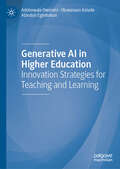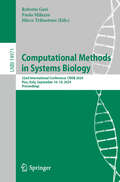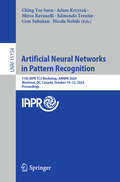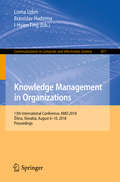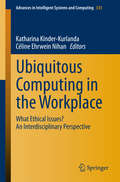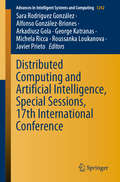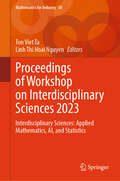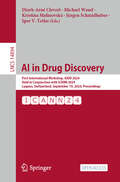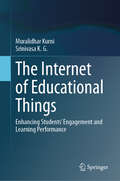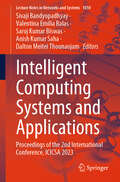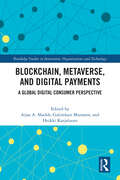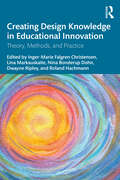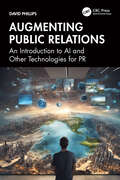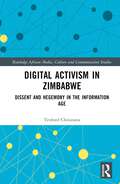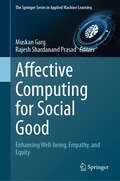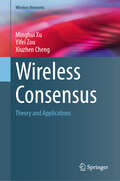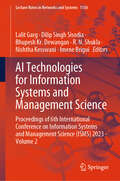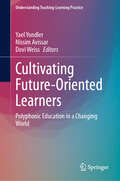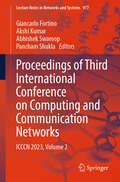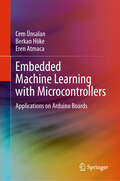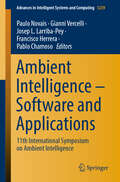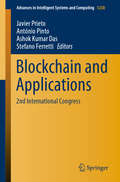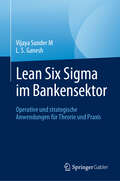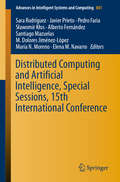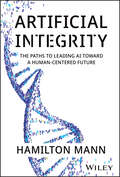- Table View
- List View
Generative AI in Higher Education: Innovation Strategies for Teaching and Learning
by Abiodun Egbetokun Oluwaseun Kolade Adebowale OwoseniWith the integration of generative artificial intelligence (AI), teachers and learners now have access to powerful tools to enhance their productivity and effectiveness in their work. To meet the demands of this dynamic educational landscape, teachers must embrace AI to handle repetitive tasks, freeing them to focus on more intelligent and humanistic responsibilities. For learners, responsible use of AI could make learning more fun, personalized, flexible, and enriching. This insightful new book explores the evolving role of educators in higher education in a world of rapid technological advancements and provides a practical outline of the available technologies. By integrating Generative AI into teaching and learning, Higher Education Institutions can contribute to achieving inclusive and equitable quality education, a target of the UN Sustainable Development Goals, and promote lifelong learning opportunities for all. Generative AI can be used to enhance teaching and learning experiences, foster creativity, and develop new learning experiences in higher education. This book is a valuable resource for educators navigating the ever-changing landscape of education technology. With scientific background, practical insights and actionable tips, this book will be of interest to scholars of emerging technologies and innovation in education. It will also be of practical use to instructors seeking to harness the power of generative AI, enhancing productivity and transforming their approach to personalized learning.
Computational Methods in Systems Biology: 22nd International Conference, CMSB 2024, Pisa, Italy, September 16–18, 2024, Proceedings (Lecture Notes in Computer Science #14971)
by Paolo Milazzo Mirco Tribastone Roberta GoriThis book constitutes the refereed proceedings of the 22nd International Conference on Computational Methods in Systems Biology, CMSB 2024, which took place in Pisa, Italy, during September 16-18, 2024. The 11 full papers included in this book were carefully reviewed and selected from 23 submissions. They deal with computational methods and tools in systems and synthetic biology and their applications, focusing on topics such as modeling and simulation; high-performance methods for computational systems biology; identification of biological systems; applications of machine learning; network modeling, analysis, and inference; automated parameter and model synthesis; model integration and biological databases; multiscale modeling and analysis methods; design, analysis, and verification methods for synthetic biology; methods for biomolecular computing and engineered molecular devices; data-based approaches for systems and synthetic biology; optimality and control of biological systems; modeling, analysis, and control of microbial communities. The conference welcomes new theoretical results with potential applications to systems and synthetic biology, as well as novel applications and case studies of existing methods, tools, or frameworks.
Artificial Neural Networks in Pattern Recognition: 11th IAPR TC3 Workshop, ANNPR 2024, Montreal, QC, Canada, October 10–12, 2024, Proceedings (Lecture Notes in Computer Science #15154)
by Edmondo Trentin Adam Krzyzak Mirco Ravanelli Nicola Nobile Ching Yee Suen Cem SubakanThis book constitutes the refereed proceedings of the 11th IAPR TC3 Workshop on Artificial Neural Networks in Pattern Recognition, ANNPR 2024, held in Montreal, QC, Canada, during October 10–12, 2024. The 27 full papers presented together were carefully reviewed and selected from 46 submissions. The conference focuses on: learning algorithms and architectures; applications in medical and health sciences; applications in computer vision; applications in NLP, speech, and music; applications in environmental and biological sciences.
Knowledge Management in Organizations: 13th International Conference, KMO 2018, Žilina, Slovakia, August 6–10, 2018, Proceedings (Communications in Computer and Information Science #877)
by Lorna Uden I-Hsien Ting Branislav HadzimaThis book contains the refereed proceedings of the 13th International Conference on Knowledge Management in Organizations, KMO 2018, held in Žilina, Slovakia, in August 2018. The theme of the conference was "Emerging Research for Knowledge Management in Organizations."The 59 papers accepted for KMO 2018 were selected from 141 submissions and are organized in topical sections on: Knowledge management models and analysis; knowledge sharing; knowledge transfer and learning; knowledge and service innovation; knowledge creation; knowledge and organization; information systems and information science; knowledge and technology management; data mining and intelligent science; business and customer relationship management; big data and IoT; and new trends in IT.
Ubiquitous Computing in the Workplace: What Ethical Issues? An Interdisciplinary Perspective (Advances in Intelligent Systems and Computing #333)
by Katharina Kinder-Kurlanda Céline Ehrwein NihanThis book provides an interdisciplinary collection of views on the ethical challenges and opportunities of workplaces in the Internet of things. Current developments within Ubiquitous computing (ubicomp) systems designed for the workplace are introduced and philosophical, organizational and socio-ethical considerations of ubicomp in workplaces are provided. Suggestions regarding the rules that should be respected in order to favor an adequate implementation of ubicomp in the workplace are offered, considering both intra-organizational but also wider societal concerns. The interdisciplinary collection of contributions invites the reader to engage in the discussion of ubicomp in everyday working environments.
Distributed Computing and Artificial Intelligence, Special Sessions, 17th International Conference (Advances in Intelligent Systems and Computing #1242)
by Javier Prieto Alfonso González-Briones Roussanka Loukanova Sara Rodríguez González Arkadiusz Gola George Katranas Michela RiccaThis book brings together past insights, current research and promising future trends associated with distributed computing, artificial intelligence and their application in order to provide efficient solutions to real-world problems. The book is based on the International Conference on Distributed Computing and Artificial Intelligence 2020 (DCAI 2020), which provided a forum to present applications of innovative techniques for studying and solving complex problems in artificial intelligence and computing areas. It includes contributions on well-established and evolving areas of research, by authors from 26 countries, representing a truly “wide area network” of research activity
Proceedings of Workshop on Interdisciplinary Sciences 2023: Interdisciplinary Sciences: Applied Mathematics, AI, and Statistics (Mathematics for Industry #38)
by Ton Viet Ta Linh Thi Hoai NguyenThis volume features a selection of technical papers presented at the workshop “The Fifth Workshop on Interdisciplinary Sciences (WIS 2023)". Contributions from esteemed researchers and academics in applied mathematics, AI, and statistics offer valuable insights into their latest research. The papers also delve into interdisciplinary applications, spanning fields such as agriculture and economics, with strong emphasis on data analysis techniques. We hope this proceedings volume will serve as a valuable resource for scholars, researchers, and practitioners interested in the recent advancements and emerging trends in interdisciplinary sciences.
AI in Drug Discovery: First International Workshop, AIDD 2024, Held in Conjunction with ICANN 2024, Lugano, Switzerland, September 19, 2024, Proceedings (Lecture Notes in Computer Science #14894)
by Igor V. Tetko Jürgen Schmidhuber Michael Wand Kristína Malinovská Djork-Arné ClevertThis open Access book constitutes the refereed proceedings of the First International Workshop on AI in Drug Discovery, AIDD 2024, held as a part of the 33rd International Conference on Artificial Neural Networks, ICANN 2024, in Lugano, Switzerland, on September 19, 2024. The 12 papers presented here were carefully reviewed and selected for these open access proceedings. These papers focus on various aspects of the rapidly evolving field of Artificial Intelligence (AI)-driven drug discovery in chemistry, including Big Data and advanced Machine Learning, eXplainable AI (XAI), Chemoinformatics, Use of deep learning to predict molecular properties, Modeling and prediction of chemical reaction data and Generative models.
The Internet of Educational Things: Enhancing Students’ Engagement and Learning Performance
by K. G. Srinivasa Muralidhar KurniThe Internet of Educational Things - Enhancing Students’ Engagement and Learning Performance delves into the transformative potential of the Internet of Things (IoT) within education. This comprehensive guide explores how IoT technology can revolutionize traditional teaching methods and learning environments, fostering more interactive, adaptive, and data-driven experiences. The book covers a wide range of topics, including the development of IoT-enabled classrooms, intelligent tutoring systems, and online labs. By leveraging real-time data and advanced analytics, educators can personalize learning paths, enhance student engagement, and optimize resource allocation. Practical applications, real-world examples, and case studies illustrate the benefits and challenges of incorporating IoT in educational settings, making it a valuable resource for students, teachers, researchers, and policymakers. The book provides practical implementation strategies and addresses critical issues such as data privacy, cybersecurity, and ethical considerations. It thoroughly examines the latest technologies, including AI, AR, VR, and digital twins, and their integration with IoT to create futuristic learning environments. The book’s unique contribution lies in its emphasis on securing IoT systems and its recommendations for overcoming infrastructure readiness and staff training obstacles. By presenting a forward-looking perspective on the role of IoT in education, this book aims to equip stakeholders with the knowledge and tools necessary to create innovative, inclusive, and secure learning ecosystems that prepare students for the future.
Intelligent Computing Systems and Applications: Proceedings of the 2nd International Conference, ICICSA 2023 (Lecture Notes in Networks and Systems #1010)
by Valentina Emilia Balas Sivaji Bandyopadhyay Dalton Meitei Thounaojam Saroj Kumar Biswas Anish Kumar SahaThe book includes peer-reviewed papers presented at the 2nd International Conference on Intelligent Computing Systems and Applications (ICICSA 2023). The book discusses the most recent advances in artificial intelligence, machine learning, data science, natural language processing, computer vision, image processing, embedded systems, robotics, IoT, computer networking and communications, optimization, security, and cryptography, among other topics. It also discusses several application areas and modeling methodologies in many fields. This book will be useful for researchers and academics working in relevant fields.
Blockchain, Metaverse, and Digital Payments: A Global Digital Consumer Perspective (Routledge Studies in Innovation, Organizations and Technology)
by Galimkair Mutanov Aijaz A. Shaikh Heikki KarjaluotoBlockchain, metaverse, and digital payment technologies, collectively called digital ecosystem, have received much attention from academia, regulators, and industry alike. However, their usage across various sub-sectors of the economy and industry is slow, and deployment is still largely experimental. Due to its secure nature, many industrial players including banking and payment firms are looking for ways on using blockchain to develop consumer confidence and trust in the digital payments for wider adoptability and use.This book provides an in-depth and relevant overview of the main theories, frameworks, technologies and innovations, institutional structures or regulations (GDPR, PSD2), and empirical research that investigates users’ perspectives on blockchain technologies, metaverse, and digital payments. With chapters from international contributors, the book presents historical and contemporary developments, innovations, laws and legislation, research, and analysis using qualitative, quantitative, and mixed-method approaches to the adoption and continuous usage of these technologies and platforms.This timely collection offers valuable insights and empirical findings for bank executives, regulators, payment associations (VISA, MasterCard, etc.), policymakers, FinTech, BigTech, and start-up leaders who express interest in blockchain, metaverse, digital payments, as well as academia and researchers in the fields of business management, digital economy, digital technologies, and digital marketing.
Creating Design Knowledge in Educational Innovation: Theory, Methods, and Practice
by Lina Markauskaite Nina Bonderup Dohn Dwayne Ripley Roland Hachmann Christensen, Inger-Marie FalgrenExamining how research-informed design knowledge is created, represented, and used in educational research and innovation projects, this book offers theoretical, methodological, and practical guidance on how to (and how not to) create, represent, and (re)use research-informed design principles.The chapters explore how educational researchers, designers, teachers, and other innovating practitioners can make outcomes of educational research and innovation projects scalable, readily applicable in educational design, and impactful on practice. They offer methodological "know-how" that is theoretically robust and grounded in research and design experiences. Providing critical reflection on current theories, methods, and practices, this book also considers directions for the future in light of developments in semantic web technologies, AI, and other emerging technologies.This book is a helpful guide for researchers, research students, and innovation designers who aim to produce and apply design knowledge that is robust, grounded in research, and practically useful as a part of diverse research and innovation projects.
Augmenting Public Relations: An Introduction to AI and Other Technologies for PR
by David PhillipsAugmenting Public Relations examines how existing technologies used in Public Relations (PR) are being significantly augmented because of the advent of Artificial Intelligence (AI). The book describes the opportunities and pitfalls of AI, recent and emerging technologies, and projections in their development, offering an introduction to practitioners on how they, too, can create their own AI-enhanced tools.The developments in augmented, virtual and meta-reality, aided by AI, have now become serious contenders for commercial communication, and the ability to harness this visual capability is explained in some detail. As is the ability for practitioners to automatically monitor and feed websites using Application Programming Interfaces (APIs). The book also considers computer games as a form of communication, and the evolving application of games supported by AI. In recent years, the PR monitoring industry has deployed AI to search for content of interest to clients across a vast range of media. It throws up huge amounts of data to be managed. The book explores how such resources can be harnessed for intelligence gathering and activity deployment in easy-to-understand language. The book also covers a range of other activities from ‘brain to computer communication’ to chatbots, including applications used by the Internet of Things, Security Issues and Crisis Management, and the crucial subject of Ethics.Examining a range of new practices for the PR industry, and covering both principles and applications, this book will be of great value to students, academics and practitioners alike.
Digital Activism in Zimbabwe: Dissent and Hegemony in the Information Age (Routledge African Media, Culture and Communication Studies)
by Tenford ChitananaThis book investigates the role of the internet and social media in political processes in non-western and non-democratic contexts. Using Zimbabwe as a case study, the book demonstrates how activists and ordinary people deploy social media, particularly Facebook, to subvert an enduring hegemonic state. However, the book also highlights how authoritarian regimes are in turn learning and adapting to the information age, challenging the impact of digital activism. Studies of digital activism in the Global South are often centred around democracy, but this book paints a more complex picture, examining the role and effect of digital activism in challenging state hegemony in authoritarian contexts. The book notes that while communication technologies help mediate activism, they are also simultaneously constrained by pre-existing and emergent challenges tied to the social and political context and the inherent limitations of those technologies. The book investigates the tactics used by digital activists, the contextual factors and restrictive political environment they operate in, including the role of pro-government activists, and ultimately, the impact of digital activism given these constraints. From the case of Zimbabwe, the book builds out a broader theoretical analysis of the evolution of ‘third world protest’ in the digital age, examining the limitations of activists’ actions and the ideological deficit in online activism to ferment a virulent counter hegemony.
Affective Computing for Social Good: Enhancing Well-being, Empathy, and Equity (The Springer Series in Applied Machine Learning)
by Muskan Garg Rajesh Shardanand PrasadAffective Computing for Social Good: Enhancing Well-being, Empathy, and Equity offers an insightful journey into the intricate realm of affective computing. It covers a spectrum of topics ranging from foundational theories and technologies to ethical considerations and future possibilities. Beginning with "Deciphering the Emotional Spectrum: Advances in Emotion Science and Analysis," it sets the stage by tracing the evolution of understanding human emotions. Subsequent chapters explore practical applications, such as integrating clinical psychology with affective computing for therapeutic progress and leveraging affective computing in diagnosing and managing mood disorders more efficiently. As the narrative unfolds, the book emphasizes the crucial role of affective computing in fostering social justice and equity. It underscores the need for developing inclusive algorithms and databases while addressing ethical challenges like privacy, consent, and the risk of emotional manipulation. These discussions emphasize the significance of ethical deployment and regulation. The book also covers the technical aspects and applications of affective computing, including natural language processing for emotion recognition and analysis, voice emotion detection, and visual emotion recognition. It extends to applications, such as the use of affective computing in health management via recommender systems and personalized well-being interventions in mental health care. Addressing data challenges, "Enhancing Affective Computing with Data Augmentation: Strategies for Overcoming Limited Data Availability" presents solutions for imbalances affecting model performance. "Advancements in Multimodal Emotion Recognition" highlights the integration of facial expressions with physiological signals to improve emotion recognition accuracy and reliability. Concluding with "Ethical Considerations in Affective Computing" and "Cognitive Currents: A Path from Neuroscience to Consciousness," the book connects technical advancements in affective computing with broader ethical and philosophical inquiries surrounding consciousness and the human experience. Features: Helps readers understand the potential benefits of emotionally intelligent AI systems, such as improving mental health care, enhancing education, or promoting more ethical decision-making. Addresses ethical considerations related to the development and deployment of emotionally intelligent AI systems, helping readers to become more aware of the potential risks and trade-offs involved. Presents new approaches or frameworks for developing emotionally intelligent AI systems, providing readers with innovative ideas and perspectives. Provides examples of successful case studies where emotionally intelligent AI systems were used for social good, which may inspire readers to think about how they can contribute to society through AI development. Overall, this book will help readers gain a deeper understanding of the intersection between AI and human emotions, and how this technology can be used to create a more empathetic, compassionate, and socially responsible world.
Wireless Consensus: Theory and Applications (Wireless Networks)
by Xiuzhen Cheng Minghui Xu Yifei ZouThis book explores the critical role of wireless consensus protocols in modern wireless networks. Building upon over two decades of research, it offers a comprehensive exploration of the fundamental principles, historical evolution, and unique challenges associated with wireless consensus. Beyond the theoretical underpinnings, the book delves into practical solutions for ensuring fault tolerance and resilience against malicious attacks, introducing cutting-edge techniques like fault-tolerant wireless consensus and Byzantine fault-tolerant wireless consensus. Recognizing the transformative potential of blockchain technology, the book also explores its integration with wireless networks, highlighting the emergence of wireless blockchain. Through in-depth analysis, real-world case studies, and forward-thinking insights, this book empowers readers to understand, design, and implement robust wireless consensus systems. Overall, wireless consensus protocols are essential for enabling reliable decision-making and coordination in wireless networks, particularly in challenging environments with unreliable communication and no central authority. These protocols empower devices to reach agreement on a common state or course of action, ensuring network consistency and security. Additionally, efficient consensus algorithms are crucial for resource-constrained wireless settings, optimizing bandwidth and energy usage to facilitate scalability and broad adoption. With applications spanning IoT, mobile computing, and distributed robotics, wireless consensus underpins critical operations like coordination and data fusion. This book serves as a valuable resource for both academics and industry professionals. Advanced-level computer science students will find it a suitable supplementary text, while researchers and practitioners seeking a deep understanding of wireless consensus protocols will benefit from its comprehensive coverage. By blending theoretical foundations with practical applications in contemporary wireless networks, this book offers a robust guide for navigating the complexities of the field.
AI Technologies for Information Systems and Management Science: Proceedings of 6th International Conference on Information Systems and Management Science (ISMS) 2023 - Volume 2 (Lecture Notes in Networks and Systems #1136)
by Lalit Garg Nishtha Kesswani Imene Brigui Dilip Singh Sisodia Bhupesh Kr. Dewangan R. N. ShuklaThis text will be replaced by the correct informationtext as soon as we get it.
Cultivating Future-Oriented Learners: Polyphonic Education in a Changing World (Understanding Teaching-Learning Practice)
by Nissim Avissar Yael Yondler Dovi WeissThe book Cultivating Future-Oriented Learners: Polyphonic Education in a Changing World offers a new theoretical and practical educational approach, responding to our era's challenges. The polyphonic paradigm it proposes uses current educational elements to produce "a new whole" connecting technology, varied learning spaces, humanizing pedagogy, and global values of personal, social, and environmental responsibility. Combining all these elements, the presented polyphonic wisdom model enables teachers to design a technology-enhanced, pluralistic, and dynamic learning environment where individual voices are heard while all the voices harmonize. Centered around human dignity and affinity between the personal and collective good, it aspires to assist educators in cultivating productive and value-based future citizens and teachers within a democratic society. The book introduces thirteen unique teaching models to foster humanizing global values: diversity and inclusion, ecohumanistic responsibility, and a dialogue between diverse stands and perspectives. It guides learners toward attaining their objectives by acquiring independent learning skills. Together, these teaching models are a catalogue of practical implementation choices of the polyphonic wisdom model in various educational frameworks. The envisaged readership encompasses educators and related professionals, but no less so anyone concerned about the current educational crisis who wishes to rethink education, technology, and values such as present and future personal, social, and environmental responsibility.
Proceedings of Third International Conference on Computing and Communication Networks: ICCCN 2023, Volume 2 (Lecture Notes in Networks and Systems #977)
by Giancarlo Fortino Akshi Kumar Abhishek Swaroop Pancham ShuklaThis book includes selected peer-reviewed papers presented at third International Conference on Computing and Communication Networks (ICCCN 2023), held at Manchester Metropolitan University, UK, during 17–18 November 2023. The book covers topics of network and computing technologies, artificial intelligence and machine learning, security and privacy, communication systems, cyber-physical systems, data analytics, cybersecurity for Industry 4.0, and smart and sustainable environmental systems.
Embedded Machine Learning with Microcontrollers: Applications on Arduino Boards
by Cem Ünsalan Berkan Höke Eren AtmacaThis textbook introduces basic and advanced embedded machine learning methods by exploring practical applications on Arduino boards. By covering traditional and neural network-based machine learning methods implemented on microcontrollers, the text is designed for use in courses on microcontrollers and embedded machine learning systems. Following the learning-by-doing approach, the book will enable students to grasp embedded machine learning concepts through real-world examples, providing them with the design and implementation skills needed for a competitive job market. By utilizing a programming environment that enables students to reach and modify microcontroller properties easily, the material allows for fast implementation of the developed system. Students are guided in implementing machine learning methods to be deployed and tested on microcontrollers throughout the book, with the theory behind the implemented methods also emphasized. Sample codes and real-world projects are available for readers and instructors. The book will also be an ideal reference for practicing engineers and electronics hobbyists.
Ambient Intelligence – Software and Applications: 11th International Symposium on Ambient Intelligence (Advances in Intelligent Systems and Computing #1239)
by Paulo Novais Francisco Herrera Pablo Chamoso Gianni Vercelli Josep L. Larriba-PeyThis book includes the outcomes of the 11th International Symposium on Ambient Intelligence (ISAmI 2020). The 11th International Symposium on Ambient Intelligence is hosted by the University of L’Aquila and is going to be held in L’Aquila (Italy). Initially planned on the 17th to the 19th of June 2020, it was postponed to the 7th to the 9th of October 2020, due to the COVID-19 outbreak.
Blockchain and Applications: 2nd International Congress (Advances in Intelligent Systems and Computing #1238)
by Stefano Ferretti Javier Prieto António Pinto Ashok Kumar DasThis book constitutes the refereed proceedings of the 1st International Congress on Blockchain and Applications 2020, BLOCKCHAIN’20, held in L’Aquila, Italy, in October 2020. Among the scientific community, blockchain and artificial intelligence are a promising combination that will transform the production and manufacturing industry, media, finance, insurance, e-government, etc. Nevertheless, there is no consensus with schemes or best practices that would specify how blockchain and artificial intelligence should be used together. The 21 full papers presented were carefully reviewed and selected from over 40 submissions. They contain the latest advances on blockchain and artificial intelligence and on their application domains, exploring innovative ideas, guidelines, theories, models, technologies, and tools, and identifying critical issues and challenges that researchers and practitioners must deal with in future research.
Lean Six Sigma im Bankensektor: Operative und strategische Anwendungen für Theorie und Praxis
by Vijaya Sunder M L. S. GaneshDieses Buch untersucht eine Reihe möglicher Wege, Modelle sowie operativer und strategischer Ansätze für Lean Six Sigma (LSS), eine zeitgemäße Praxis der kontinuierlichen Verbesserung (CI) zur Erzielung eines qualitätsbasierten Wettbewerbsvorteils in Organisationen. Fallstudien von Lean-Six-Sigma-Projekten in Bankunternehmen helfen, die operativen Dimensionen von LSS zu veranschaulichen, während die hier vorgestellten fallspezifischen und fallübergreifenden Analysen den strategischen Wert von LSS demonstrieren. Die Falldaten, die zur Gewinnung der Erkenntnisse herangezogen wurden, stammen zwar aus dem Bankensektor, ermöglichen jedoch eine Verallgemeinerung über den Bank- und Finanzdienstleistungssektor hinaus.Das Buch vertritt die Auffassung, dass LSS nicht nur eine KI-Praxis ist, sondern eine übergeordnete organisatorische Fähigkeit, genauer gesagt eine dynamische Fähigkeit, die es Unternehmen ermöglicht, einen auf Qualität basierenden Wettbewerbsvorteil zu erzielen. Das Buch richtet sich an Praktiker und Forscher gleichermaßen und schafft ein Gleichgewicht zwischen Theorie und Praxis.Für Praktiker bietet es einen Leitfaden für den Einsatz von LSS zur Erzielung von Wettbewerbsvorteilen und für evidenzbasierte Praktiken im Qualitätsmanagement und der operativen Exzellenz. Für Wissenschaftler stellt es eine Fülle von Literatur vor und erweitert den Wissensschatz zum Qualitätsmanagement. Dementsprechend ist das Buch sowohl für Praktiker als auch für Forscher von unschätzbarem Wert, da es ersteren hilft, den Wert von LSS sowohl als operative als auch als strategische Ressource zu erschließen, und letzteren potenzielle Forschungsrichtungen und Anwendungen aufzeigt."Dieses Buch vermittelt ein tiefes Verständnis der Lean Six Sigma-Anwendungen. Es inspiriert, indem es die Prinzipien des Konzepts auf ungewöhnliche Bereiche von Betrieb und Management jenseits des üblichen Qualitäts- und Projektmanagements überträgt. Beim Lesen des Buches kam mir die großartige Idee, Lean Six Sigma auch in meinem digitalen Unternehmenanzuwenden. Am Ende des Buches hatte ich den Eindruck, dass die Möglichkeiten für den richtigen Einsatz von Lean Six Sigma grenzenlos sind, insbesondere wenn man es aus der Perspektive der dynamischen Fähigkeiten betrachtet. Die Leser dieses Buches werden sicherlich Einblicke in die Verbesserung ihrer Geschäftsprozesse sowohl in operativer als auch in strategischer Hinsicht erhalten. Obwohl sich das Buch auf den Bankensektor konzentriert, eignet es sich eigentlich für ein sehr breites Publikum. Es handelt sich um eine brillante Forschungsarbeit und ein Buch, das als Leitfaden für die Transformation durch das Prisma von Lean Six Sigma dienen wird."- Professorin. Dr. ZornitsaYordanova, Leitende Assistenzprofessorin für Innovationsmanagement, Universität für nationale und internationale Wirtschaft, Sofia, Bulgarien"Lean Six Sigma muss aus einer Systemperspektive heraus verstanden werden, undes besteht eine große Wissenslücke in diesem Bereich, wenn es darum geht, ganzheitliche Lösungen für Geschäftsprobleme zu finden. Dieses Buch ist ein sehr willkommenes Werk, das diese Forderung aufgreift. Es integriert die Ressourcen des Qualitätsmanagements und die Sichtweise der dynamischen Fähigkeiten in die Praxis. Der Bereich Banken und Finanzdienstleistungen wurde passend gewählt, da er für Sozialunternehmen am unmittelbarsten anwendbar ist. Jeder, der mit weniger Mitteln mehr Wirkung erzielen möchte, wird von der Lektüre dieses Buches profitieren.-Alex Abraham, Hauptgeschäftsführer, Lean Success Partners, Winnipeg, Manitoba, Kanada"Das Buch ist eine erfrischende Bereicherung für die Welt des Qualitätsmanagements, insbesondere im Kontext von Banken und Finanzdienstleistungen. Konzepte und Begriffe wie "Schnelligkeit von Lean & Robustheit von Six Sigma zur Lösung operativer Probleme" "Hybride Methodik" passen sehr gut zu dem, was wir heute in der Branche tun.Ein weiterer interessanter Aspekt des Buches ist die Anwendung des "Dynamic Capabilities"-Ansatze
Distributed Computing and Artificial Intelligence, Special Sessions, 15th International Conference (Advances in Intelligent Systems and Computing #801)
by Sara Rodríguez María N. Moreno Alberto Fernández Pedro Faria Javier Prieto Sławomir Kłos Santiago Mazuelas M. Dolores Jiménez-López Elena M. NavarroThis book presents the outcomes of the 15th International Conference on Distributed Computing and Artificial Intelligence, held in Toledo (Spain) from 20th to 22nd June 2018 and hosted by the UCLM, and which brought together researchers and developers from industry, education and the academic world to report on the latest scientific research, technical advances and methodologies. Highlighting multi-disciplinary and transversal aspects, the book focuses on the conferences Special Sessions, including Advances in Demand Response and Renewable Energy Sources in Smart Grids (ADRESS); AI- Driven Methods for Multimodal Networks and Processes Modeling (AIMPM); Social Modelling of Ambient Intelligence in Large Facilities (SMAILF); Communications, Electronics and Signal Processing (CESP); Complexity in Natural and Formal Languages (CNFL); and Web and Social Media Mining (WASMM).
Artificial Integrity: The Paths to Leading AI Toward a Human-Centered Future
by Hamilton MannNavigating the transitions to the future of AI—Integrity over Intelligence Envision a world where artificial intelligence can deliver integrity-led outcomes seamlessly, adapting to diverse cultural context, value models, and situational nuances, countering subconscious biases, all while operating in an advanced human-centered manner. This is the promise of Artificial Integrity. In Artificial Integrity, digital strategist, technologist, doctoral researcher, acclaimed management thinker, and seasoned business executive Hamilton Mann emphasizes that the challenge of AI is in ensuring systems that exhibit integrity-led capabilities over the pursuit of mere general or super intelligence. Mann tackles the inadequacies of traditional ethical frameworks in handling the complexities of new AI technologies to make them trustworthy and reliable as they profoundly impact human lives. Introducing the transformative concept of “artificial integrity,” Mann proposes a paradigm shift, defining a “code of design” to ensure AI systems align with, amplify, and sustain human values and societal norms, maximizing integrity-led AI outcomes. Artificial Integrity discusses practical insights into driving a future where AI enhances, without replacing, human capabilities while being inclusive and reflective of diverse human experiences, emphasizing human agency. The book offers: Guiding posts and step-by-step solutions for designing, implementing and continuously aligning AI development to responsibly advance human and artificial co-intelligence Strategies and actionable advice for integrating AI into business and societal structures Practical paths toward managing the transition to the future of AI for human productivity and decision-making while maintaining sustainable trustworthiness Artificial Integrity is essential for anyone involved in AI development, from executives, business leaders, and managers to entrepreneurs, tech enthusiasts and policymakers. It's also perfect for laypeople interested in how AI intersects with society. Dive into this compelling and thought provoking read to ensure you are prepared for the challenges and opportunities that lie ahead in a human-centered AI-driven future.
